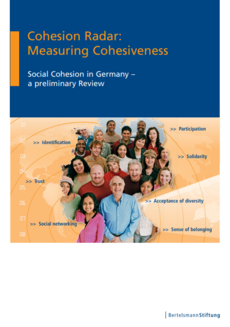Social cohesion is unquestionably one of the crucial challenges of our time. The swift pace of economic change, growing mobility, and increasing social diversity carry a number of risks – the exclusion of certain sections of the population, conflicts between different groups, declining solidarity, and loss of legitimacy on the part of political institutions.
The present study, Social Cohesion in Germany represents a preliminary step towards finding an answer to this and other questions. The authors provide an overview of the concepts and approaches that are brought to bear on the issue and define and operationalise social cohesion in such a way that it becomes possible to measure its constituent variables and subject them to international comparisons.
The study on Social Cohesion in Germany is divided into three main sections. Part 1, Cohesion Research, explains the current relevance of the topic and describes both the international academic discourse and the socio-political debate. Part 2, Social Cohesion, discusses various possibilities for defining cohesion and suggests measurement indicators while at the same time touching on the downsides of cohesion. The empirical results compiled by the authors from numerous studies and data records can be found in Part 3, The Status of Social Cohesion in Germany. This section presents and discusses the manifestations of cohesion in terms of three dimensions, social relationships, connectedness, and orientation towards the common good, before concluding with an overall evaluation.
- Format Type
- Date of publication
- 30/11/2012
- Edition
- 1. edition
- Volume/Format
- 88 pages, PDF
Format
-
PDF
Price
Free of charge





